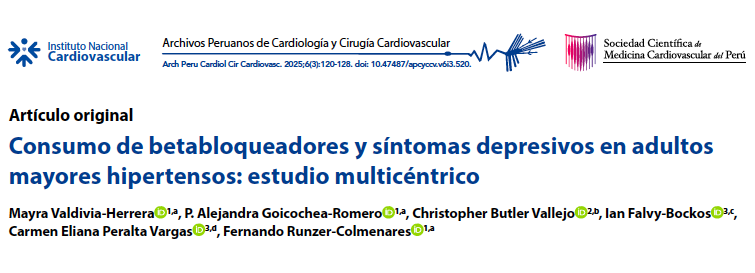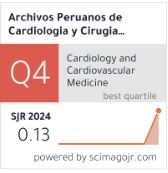Consumo de betabloqueadores y síntomas depresivos en adultos mayores hipertensos: estudio multicéntrico
DOI:
https://doi.org/10.47487/apcyccv.v6i3.520Palabras clave:
Anciano, Hipertensión, Antagonistas Adrenérgicos beta, Depresión, PerúResumen
Objetivos. Evaluar la asociación entre el uso de betabloqueadores (BB) y la presencia de síntomas depresivos en adultos mayores con hipertensión arterial (HTA). Materiales y métodos. Se realizó un estudio observacional de corte transversal en pacientes del Hospital Central FAP y del Centro Médico Naval. Se incluyeron adultos mayores con diagnóstico de HTA en tratamiento antihipertensivo durante al menos un mes. Los síntomas depresivos se evaluaron mediante el cuestionario PHQ-9. Se analizaron variables sociales, clínicas y funcionales mediante pruebas bivariadas (chi cuadrado y prueba exacta de Fisher), así como regresión de Poisson con varianza robusta para estimar razones de prevalencia (RP) crudas y ajustadas. Resultados. Se incluyeron 149 adultos mayores. El 27,5% consumía BB y el 39% presentó síntomas depresivos. No se encontró asociación significativa entre el uso de BB y la presencia de síntomas depresivos (RP: 1,09; IC 95%: 0,70–1,69; p = 0,693). En cambio, se observó mayor riesgo de síntomas depresivos en pacientes con mayor fragilidad (RP: 5,72; IC 95%: 2,17–15,0; p < 0,001) y menor riesgo en aquellos con estudios técnicos o universitarios (RP: 0,43; IC 95%: 0,25–0,74; p = 0,003). Conclusiones. No se encontró asociación entre el uso de BB y los síntomas depresivos en pacientes con HTA. Factores como la fragilidad, el nivel educativo y el tiempo de diagnóstico de HTA mostraron asociaciones significativas y deben considerarse en la evaluación integral del riesgo emocional en esta población
Descargas
Referencias
Oliveros E, Patel H, Kyung S, Fugar S, Goldberg A, Madan N, et al. Hypertension in older adults: Assessment, management, and challenges. Clin Cardiol. 2020;43(1):99-107. doi: 10.1002/clc.23292.
Organización Mundial de la Salud (OMS). Hipertensión [Internet]. Ginebra: OMS; 2023 [citado el 5 de septiembre de 2025]. Disponible en: https://www.who.int/es/news-room/fact-sheets/detail/hypertension
Camafort M, Alcocer L, Coca A, Lopez-Lopez JP, López-Jaramillo P, Ponte-Negretti CI, et al. Latin-American Ambulatory Blood Pressure Registry (MAPA-LATAM): An urgent need. Rev Clin Esp. 2021;221(9):547-52. doi: 10.1016/j.rce.2021.03.001.
Instituto Nacional de Estadística e Informática. Perú: Enfermedades No Transmisibles y Transmisibles [Internet]. Lima: INEI; 2022 [citado el 5 de septiembre de 2025]. Disponible en: https://www. gob.pe/institucion/inei/informes-publicaciones/4233635-peruenfermedades-no-transmisibles-y-transmisibles-2022
Gan Q, Yu R, Lian Z, Yuan Y, Li Y, Zheng L. Unraveling the link between hypertension and depression in older adults: a meta-analysis. Front Public Health. 2023;11:1302341. doi: 10.3389/fpubh.2023.1302341.
Organización Mundial de la Salud (OMS). Depresión [Internet]. Ginebra: OMS; 2023 [citado el 5 de septiembre de 2025]. Disponible en: https://www.who.int/es/news-room/fact-sheets/detail/ depression
Chowdhury EK, Berk M, Nelson MR, Wing LMH, Reid CM. Association of depression with mortality in an elderly treated hypertensive population. Int Psychogeriatr. 2019;31(3):371-81doi: 10.1017/ S1041610218002294.
Zhang Y, Chen Y, Ma L. Depression and cardiovascular disease in elderly: Current understanding. J Clin Neurosci. 2018;47:1-5. doi: 10.1016/j.jocn.2017.09.022.
Martina-Chávez M, Hoshi IA, Watanabe SPS, Aguilar RSA, ZeladitaHuaman JA, Parra HC. Depression in elderly in Peru: geospatial distribution and associated factors according to ENDES 2018 - 2020. An Fac Med. 2022;83(3):180-7. doi: 10.15381/anales.v83i3.23074.
Organización Mundial de la Salud (OMS). La carga de los trastornos mentales en la Región de las Américas, 2018. Ginebra: OMS; 2018 [citado el 5 de septiembre de 2025]. Disponible en: https://www. paho.org/es/documentos/la-carga-los-trastornos-mentales-en-laregion-las-americas-2018
Cojocariu SA, Maștaleru A, Sascău RA, Stătescu C, Mitu F, LeonConstantin MM. Neuropsychiatric consequences of lipophilic beta-blockers. Medicina (Kaunas). 2021;57(1):1-13. doi: 10.3390/ medicina57010001.
Boal AH, Smith DJ, McCallum L, Muir S, Touyz RM, Dominiczak AF, et al. Monotherapy with major antihypertensive drug classes and risk of hospital admissions for mood disorders. Hypertension. 2016;68(5):1132-8. doi: 10.1161/HYPERTENSIONAHA.116.07872.
Tao SH, Ren XQ, Zhang LJ, Liu MY. Association between common cardiovascular drugs and depression. Chin Med J (Engl). 2021;134(21):2656-65. doi: 10.1097/CM9.0000000000001644.
Luijendijk HJ, Van Den Berg JF, Hofman A, Tiemeier H, Stricker BHC. β-Blockers and the risk of incident depression in the elderly. J Clin Psychopharmacol. 2011;31(1):45-50. doi: 10.1097/ JCP.0b013e318204a8f9.
Pan American Health Organization. Atención integrada para las personas mayores (ICOPE): guía sobre la evaluación y los esquemas de atención centrados en la persona en la atención primaria de salud [Internet]. Washington, DC: PAHO; 2020 [citado el 5 de septiembre de 2025]. Disponible en: https://iris.paho.org/bitstream/ handle/10665.2/51973/OPSFPLHL200004A_spa.pdf
Urtasun M, Daray FM, Teti GL, Coppolillo F, Herlax G, Saba G, et al. Validation and calibration of the patient health questionnaire (PHQ-9) in Argentina. BMC Psychiatry. 2019;19:1-7. doi: 10.1186/ s12888-019-2290-1.
Charlson ME, Pompei P, Ales KL, Mackenzie CR. A new method of classifying prognostic comorbidity in longitudinal studies: development and validation. J Chronic Dis. 1987;40(5):373-83. doi: 10.1016/0021-9681(87)90171-8.
Morley JE. A simple frailty questionnaire (FRAIL) predicts outcomes in middle-aged African Americans. J Nutr Health Aging. 2012;16(7):601- 8. doi: 10.1007/s12603-012-0404-7.
Duarte Ayala RE, Velasco Rojano ÁE. Validación psicométrica del índice de Barthel en adultos mayores mexicanos. Horiz Sanitario. 2021;21(1):1-9. doi: 10.19136/hs.a21n1.2953.
Riemer TG, Villagomez Fuentes LE, Algharably EAE, Schäfer MS, Mangelsen E, Fürtig MA, et al. Do β-Blockers Cause Depression?: Systematic Review and Meta-Analysis of Psychiatric Adverse Events during β-Blocker Therapy. Hypertension. 2021;77(5):1539-48. doi: 10.1161/HYPERTENSIONAHA.120.16785.
Kessing LV, Rytgaard HC, Ekstrøm CT, Torp-Pedersen C, Berk M, Gerds TA. Antihypertensive Drugs and Risk of Depression: A Nationwide Population-Based Study. Hypertension. 2020;76(4):1263-79. doi: 10.1161/HYPERTENSIONAHA.120.15042.
Tully PJ, Peters R, Pérès K, Anstey KJ, Tzourio C. Effect of SSRI and calcium channel blockers on depression symptoms and cognitive function in elderly persons treated for hypertension: Three city cohort study. Int Psychogeriatr. 2018;30(9):1345-54. doi: 10.1017/S1041610218000794.
Cao YY, Xiang X, Song J, Tian YH, Wang MY, Wang XW, et al. Distinct effects of antihypertensives on depression in the real-world setting: A retrospective cohort study. J Affect Disord. 2019;259:386-91. doi: 10.1016/j.jad.2019.08.018.
Li Y, Fan Y, Sun Y, Alolga RN, Xiao P, Ma G. Antihypertensive Drug Use and the Risk of Depression: A Systematic Review and Network Meta-analysis. Front Pharmacol. 2021;12:748. doi: 10.3389/ fphar.2021.00748.
Zhang L, Bao Y, Tao S, Zhao Y, Liu M. The association between cardiovascular drugs and depression/anxiety in patients with cardiovascular disease: A meta-analysis. Pharmacol Res. 2022;175:105992. doi: 10.1016/j.phrs.2021.105992.
Kraut R, Lundby C, Babenko O, Kamal A, Sadowski CA. Antihypertensive medication in frail older adults: A narrative review through a deprescribing lens. Am Heart J Plus. 2022;17:100084. doi: 10.1016/j. ahjo.2022.100084.
Patria B. The longitudinal effects of education on depression: Finding from the Indonesian national survey. Front Public Health. 2022;10:1017995. doi: 10.3389/fpubh.2022.1017995
Asmare Y, Ali A, Belachew A. Magnitude and associated factors of depression among people with hypertension in Addis Ababa, Ethiopia: a hospital based cross-sectional study. BMC Psychiatry. 2022;22(1):327. doi: 10.1186/s12888-022-03972-6.
Ibrahim AO, Agbesanwa TA, Ajetunmobi AO, Kolawole FT, Fashola AM, Olanrewaju MT. Socio-demographic profile, lifestyle changes and co-morbid ailments as predictors of medication adherence among hypertensive patients attending federal teaching hospital, ido-ekiti, southwestern, nigeria. J Integr Cardiol. 2020;6:1000300. doi: 10.15761/JIC.1000300
Renna N, Piskorz D, Stisman D, Martinez D, Lescano L, Vissani S, et al. Position statement on use of pharmacological combinations in a single pill for treatment of hypertension by Argentine Federation of Cardiology (FAC) and Argentine Society of Hypertension (SAHA). J Hum Hypertens. 2023;37(6):438-448. doi: 10.1038/s41371-021- 00557-w.

Descargas
Publicado
Número
Sección
Licencia
Derechos de autor 2025 La revista es titular de la primera publicación, luego el autor dando crédito a la primera publicación.

Esta obra está bajo una licencia internacional Creative Commons Atribución 4.0.

















